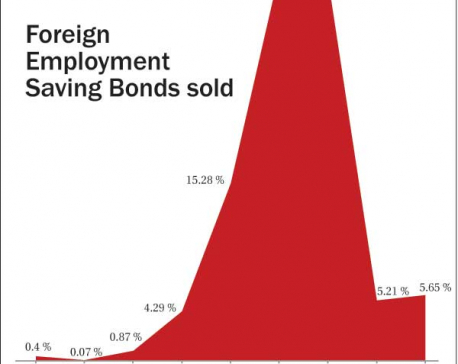
OR
Nepal fails to stop exploitation of migrant workers: AI
Published On: June 7, 2017 08:16 AM NPT By: Republica | @RepublicaNepal
KATHAMANDU, June 6: Nepali migrant workers continue to pay exorbitant fees to manpower agencies and agents to get employed in the Gulf and Malaysia due to the Nepali government's abject failure to properly enforce the low cost recruitment scheme, popularly known as free-free-ticket-policy, according to a new report released by Amnesty International on Tuesday.
Free-free-ticket-policy, which was introduced in July 2015, makes it legally binding for the employers in six countries of the Gulf and Malaysia to bear the cost of workers' air tickets and visa. The policy was expected to decrease the economic burden of workers.
However, AI"s report states that Nepali workers are still forced to pay Rs 137,000 (USD 1,346) on average to ensure that they are hired by companies in the seven countries: Malaysia, Saudi Arabia, Qatar, United Arab Emirates, Kuwait, Oman and Bahrain.
One of the reasons behind failure to implement the policy is lack of political will on the part of the Nepali government and other stakeholders in the recruitment industry to enforce the policy, AI has said. Other important reasons include unwillingness of employers and destination governments to comply with the provisions.
The report titled Turning People into Profits: Abusive Recruitment, Trafficking and Forced Labor of Nepali Migrant Workers states that the failure of Nepal's government to stop the widespread exploitation is pushing migrant workers into the “risk of forced labor abroad and leaving them with crippling debts”.
Almost all of 127 workers interviewed by AI in 2016 and 2017 had been subject to some form of abuse at the hands of private recruiters, said the report. Many of them were deceived about the nature and terms of their foreign employment and cornered into paying illegally high recruitment fees. The report also pointed out the widespread practice of confiscating passports of perspective migrants and denying them other essential documentations such as contracts and receipts.
“Despite some bright ideas, a lack of political will combined with bureaucratic inertia means that businesses are still effectively free to exploit migrants. It is abundantly clear that the Free Visa, Free Ticket policy is not being implemented or enforced properly,” said James Lynch, deputy director of Amnesty International's Global Issues Program.
“The Nepali government needs to invest fully in protecting migrant workers, starting with the proper implementation of key laws and policies which stop recruitment agencies from making quick money off the back of poor people's futures.”
Suresh, a Nepali worker from Saptari district, told Amnesty International how he had borrowed Rs 250,000 (USD 2,416) from a local moneylender, at an interest rate of 36 percent in order to pay a recruitment agent who had promised a well-paid job in Malaysia. Upon reaching Malaysia, Suresh received USD 354 less than what the recruitment agency had promised, which prompted him to leave the job without completing the tenure. Suresh said that he still owes Rs 550,000 (USD 5,317) to the local moneylender.
“The attitude of recruiters is about buying and selling people. And our people end up being abused, because the government does not prevent them from being traded like cattle,” said Suresh.
Unlike its past reports on Nepali migration, the study has made an attempt to focus on inherent links between the recruitment process and the overall migration experience of workers. Besides exploring various facets of recruitment, the report has blasted the Gulf countries and Malaysia for their apathy in providing decent working and living conditions to workers.
During her presentation, Angela Sherwood, AI lead researcher, said that migrant workers will continue to remain at risk of exploitation and abuse as long as there is no end to the widespread practice of passport confiscation and the infamous sponsorship system wherein workers" visas are tied to employers.
The report states that the exploitation of undocumented workers is especially alarming. Several Nepalis who became undocumented migrant workers told Amnesty International researchers how they were forced to seek out exploitative black-market “repatriation agents” and exploited time and again in the process of returning home.
While struggling to earn or borrow money in order to return home to Nepal, workers face threats of arrest, detention, and prosecution for immigration offences.
Officials at the Ministry of Labour and Employment refused to comment, saying they would look at the report first before putting forth their views.
You May Like This

Nepal, UAE sign MoU on migrant workers
KATHMANDU, June 14: Nepal and the United Arab Emirates (UAE) have signed a memorandum of understanding on migrant workers amidst... Read More...

Amnesty faults Nepal over migrant workers' rights
KATHMANDU, Feb 23: The government has largely failed to protect migrant workers from unlawful and criminal conducts by dishonest recruitment agencies... Read More...

Foreign employment saving bond fails to attract migrant workers
Only 5.65 percent of bond subscribed: NRB ... Read More...






Just In
- Wind storm likely at a few places of Koshi and Sudurpaschim
- EVs adoption in Nepal surge in Nepal with government support measures
- Mayors' Forum urges Finance Minister Pun to settle electricity dues
- By-Election: Voting underway in Ilam-2 and Bajhang-1(a)
- Save the Children report highlights severe impact of air pollution on children
- NATO Serving as a Catalyst to Fuel Violence
- Home Minister denies any delay in providing relief to wildfire and fire victims
- Ties with Tehran













Leave A Comment